QuestionThe queen cat i have belonged to my partner's uncle, who found her abandoned in a box as a kitten,not sure how old she was but her eyes were still closed, so she shouldnt have been taken from her mother.anyway she is aggesive towards other cats in the way of crying,growling and hissing.shes left on her own all day and i would like to get a kitten for company for her, shes about 8 years old, now ive been told off my partners mam that my queen is more than likely to kill any kitten that comes into the home.i would really like you advice if that would be ok. ive had dogs all my life, but she's my first cat and i dont was to upset her by bringing in another cat if shes not happy about it.but she is lonely.
AnswerPaula,
Just because your kitty didn't grow up with her mom and siblings doesn't mean that she's not able to relate to other cats, it just means that it will take some time to properly introduce a new kitty into the household, but I think that it would be good for your cat. Your baby girl was probably under a week old when you found her because a kitten's eyes open between 7-10 days under normal circumstances. I'd certainly recommend that you try your kitty on a homeopathic remedy called Bach's Rescue Remedy which is a blend of flower essences designed to calm and reassure. You can add 5-7 drops of Rescue Remedy to a fresh bowl of water each morning and throughout the isolation period for the new kitten you can also gently rub one drop of Rescue Remedy into the fairly fur free part of skin in front of the cat's ear. Do be careful to avoid getting any Rescue Remedy into Lulu's ear as this may be uncomfortable for her because the flower essences are preserved in a grape alcohol solution. If you do decide to adopt a kitten I'd recommend one around 10-12 weeks of age that isn't overly submissive and timid, however you also don't want the other extreme of being excessively dominant and arrogant - a kitten that's middle ground in terms of the personality would probably work out best. I'd recommend that you take the time to read up on my previous answers about proper new cat introductions as they will help ensure that everything is done in a way that will minimize stress on Lulu as well as any new kitty entering your household.
As for your mother's idea that Lulu will likely kill any kitten coming into the household I highly doubt that would happen. Intact male cats often kill litters of fairly young kittens to ensure that the queen will come into season with the hope that they will be the lucky boy to mate with that queen. The reason why tom cats will kill litters of young kittens is because the queen will come into season more quickly than she would if she was nursing and caring for a litter of kittens. I think that the best thing to do is to try and offer Lulu the chance at being a big sister but it's obviously a change that must be made very gradually with patience and understanding. I suspect that Lulu will actually have the chance to learn quite a bit about being a cat that she hasn't been able to learn because she was hand reared by a person and she just might be happy to have someone she can play with. I do think that it's a good idea to have Lulu and any potential brothers or sisters checked out thoroughly by a veterinarian to ensure that everyone is healthy enough to withstand the stress of proper introductions.
The main differenced in my recommendations for this particular introduction is that you go extra slowly with the kitten's isolation period, say 3-5 weeks instead of the usual 2-3 weeks. Obviously it's important to help Lulu understand what is happening, this would be best accomplished by using a hand towel to rub the kitten all over, then rubbing Lulu all over and finishing up with the kitten again. This will allow Lulu to gradually get comfortable with the scent of another cat. I also routinely recommend feeding the resident cat on the opposite side of the closed door where the new cat is being isolated with all of the usual kitty amenities of course. The idea behind this recommendation is that by helping Lulu associate the scent of the new kitten with something positive that she enjoys (eating, favorite treats, etc) she will be less likely to respond to the new kitten poorly in face to face meetings. It's a wonderful idea to play with Lulu and give her favorite treats outside the new kitten's door for the same reason. It's not a bad idea to consider consulting a holistic veterinarian for a more natural approach to helping keep Lulu calm and comfortable (a holistic vet is trained in conventional medicine as well as one or more alternative therapies such as homeopathy, acupuncture or even massage to name a few). I have found that the natural approach to wellness is very important and cats seem to respond well to holistic therapies, in some cases they actually respond better than they would to the use of drugs.
In short I think that so long as Lulu's new friend is properly introduced and you're willing to be patient and careful enough Lulu shouldn't have any trouble with the addition of a new friend to the household. I also think that it's important to spay Lulu if she hasn't already been sterilized. There are several medical and behavioral reasons for choosing to spay and neuter pets, but in Lulu's case it will help to reduce or eliminate territorial aggression when the levels of sex hormones in her blood drop which takes a few weeks. Sterilized cats are generally far less territorial than intact cats, they usually roam less, fight less and you don't have to worry about hearing them howl and caterwaul to advertise their availability to mate. A fairly common behavioral issue in cats that haven't been spayed/neutered is using urine or feces to mark their territory which although unpleasant for their human caregivers is a perfectly natural form of communicating using scent. Medical reasons for spaying Lulu include a reduced risk of breast cancer as well as eliminating the risk of ovarian and uterine cancer and a potentially fatal uterine infection called pyometra which causes the womb to fill with pus and in some cases the womb ruptures and floods pus throughout the abdomen which would cost a queen her life. Surgically sterilizing pets prevents any contribution to the already massive pet overpopulation problem. It is my philosophy that surgical sterilization helps the cat and his/her caregiver by preventing serious medical/behavioral issues and it's generally a way to save countless lives every year by preventing unwanted litters from being born.

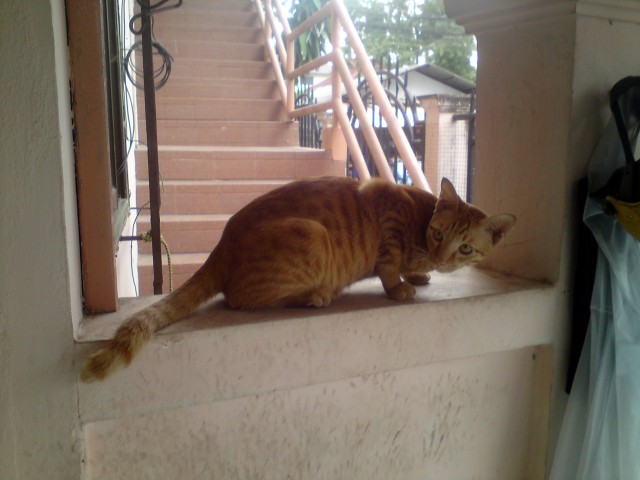 Ocicat
Question
Sesame
My daughter is currently living in Thai
Ocicat
Question
Sesame
My daughter is currently living in Thai
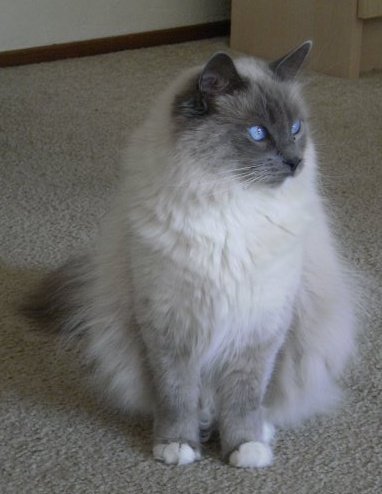 Please help
Questionmy cat
QUESTION: Hi,
I have a Ragdoll ca
Please help
Questionmy cat
QUESTION: Hi,
I have a Ragdoll ca
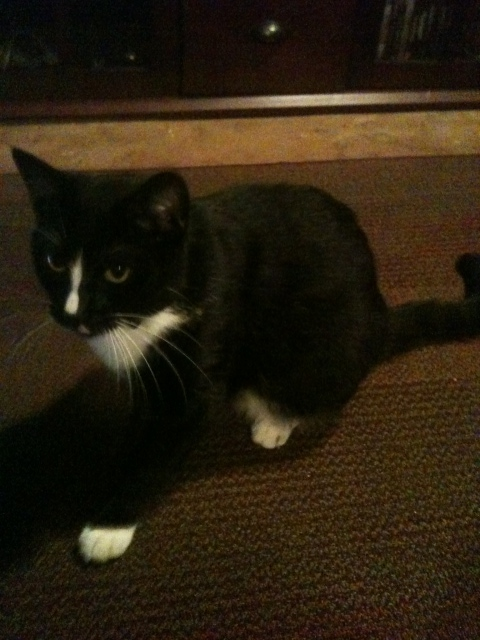 Identify Cat Breed?
Question
picture of my cat picture of my cat &nbs
Identify Cat Breed?
Question
picture of my cat picture of my cat &nbs
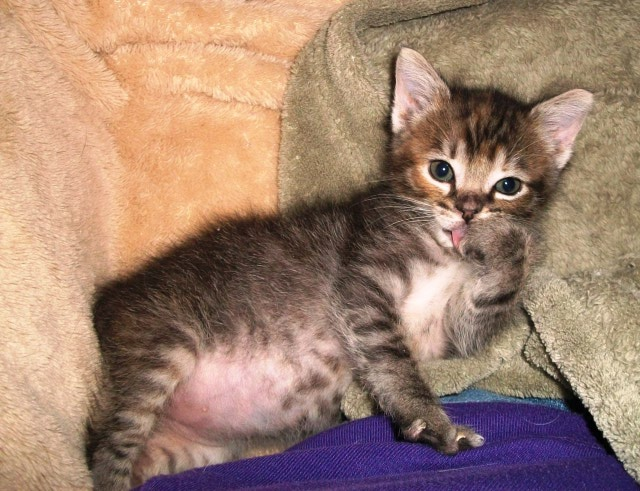 sick kitten
QuestionQUESTION: I have a 1 month old foster kitten th
sick kitten
QuestionQUESTION: I have a 1 month old foster kitten th
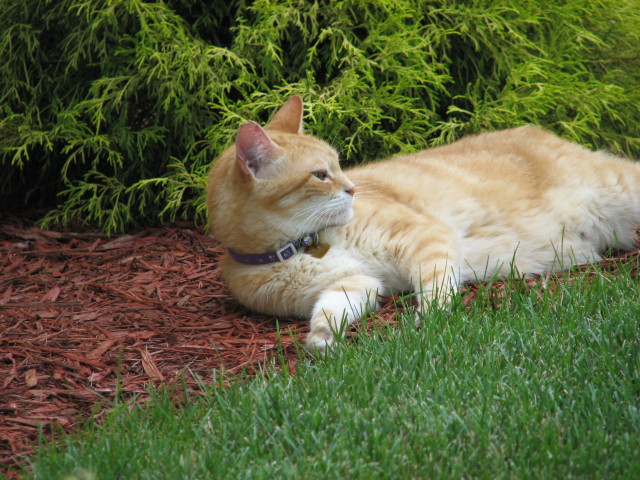 18 yr old male cat
Question
Simon at 13 years
My cat is 18 years ol
18 yr old male cat
Question
Simon at 13 years
My cat is 18 years ol